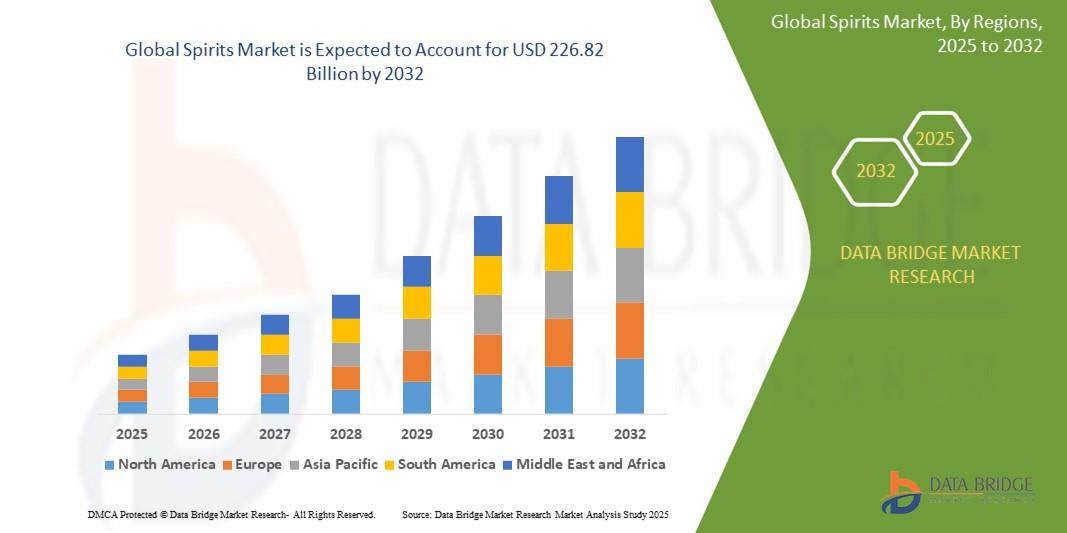Spirits Market Production, Demand and Business Outlook 2032

Introduction
The Spirits Market refers to the global industry for distilled alcoholic beverages such as whiskey, vodka, rum, gin, tequila, brandy, and liqueurs. These products are produced through distillation processes that yield beverages with higher alcohol content compared to beer or wine. The market includes production, distribution, and retail sales across on-trade and off-trade channels.
Spirits play a significant role in the global alcoholic beverages industry. They are integral to cultural, social, and celebratory events, while also driving large-scale economic contributions through employment, trade, and taxation. The global market value of spirits in 2025 is estimated at USD 580 billion, reflecting its strong demand across both developed and emerging regions.
The growing popularity of premium and craft spirits, combined with innovation in flavors and sustainable production practices, has made the spirits sector a dynamic and competitive industry.
Learn how the Spirits Market is evolving—insights, trends, and opportunities await. Download report: https://www.databridgemarketresearch.com/reports/global-spirits-market
The Evolution
The spirits market has developed over centuries, shaped by culture, tradition, and innovation. Distilled spirits were first produced in the Middle East and Europe as early as the 12th century, before expanding into global trade routes. Whiskey production in Scotland and Ireland, rum in the Caribbean, and tequila in Mexico represent long-standing traditions that continue to influence the market.
The 20th century saw industrial-scale production, global branding, and expansion of multinational distilleries. Marketing innovations such as television advertising in the mid-1900s elevated spirits to iconic consumer products.
Recent decades have introduced milestones such as:
-
The rise of premiumization, with consumers shifting toward higher-quality brands.
-
The craft distillery boom, offering small-batch, artisanal alternatives.
-
Flavored and ready-to-drink (RTD) spirits meeting the preferences of younger consumers.
-
Digitalization in sales, with e-commerce platforms increasingly contributing to retail.
Shifts in demand and technology continue to redefine the industry, with data-driven production, automated distillation, and eco-conscious packaging shaping modern operations.
Market Trends
Several clear trends are influencing the global spirits market:
-
Premium and Super-Premium Growth: Rising incomes and changing lifestyles are driving demand for high-end whiskey, cognac, and tequila.
-
Craft and Artisanal Spirits: Small-scale distilleries producing unique, local, and authentic products are gaining popularity.
-
Health-Conscious Choices: Low-alcohol and organic spirits are becoming more attractive to consumers seeking balance between indulgence and wellness.
-
Ready-to-Drink Spirits: Pre-mixed cocktails and RTD cans are expanding rapidly, especially among younger demographics.
-
Digital Sales: Online platforms and direct-to-consumer models are transforming retail distribution.
-
Sustainability Initiatives: Producers are adopting eco-friendly practices, such as reducing water use, implementing energy-efficient processes, and using recyclable packaging.
Regional consumption patterns also highlight trends, with Asia-Pacific driving whiskey growth, North America experiencing strong tequila adoption, and Europe remaining a dominant gin market.
Challenges
The spirits market faces several challenges that affect profitability and growth:
-
Regulatory Environment: Strict government regulations on advertising, labeling, and distribution limit market expansion.
-
Taxation and Tariffs: High excise duties and international trade disputes affect global exports and imports.
-
Health Concerns: Growing awareness of alcohol-related health issues leads to increased scrutiny and reduced consumption in some demographics.
-
Supply Chain Vulnerabilities: Dependence on raw materials such as grains, sugarcane, and agave can expose producers to agricultural risks and price volatility.
-
Counterfeit Products: The circulation of fake or adulterated spirits poses reputational risks and safety concerns.
-
Shifting Demographics: Younger consumers are diversifying into alternatives such as craft beer or cannabis-infused beverages, presenting competitive risks.
Market Scope
Segmentation by Type
-
Whiskey
-
Vodka
-
Rum
-
Gin
-
Tequila
-
Brandy
-
Liqueurs and Other Spirits
Segmentation by Application
-
On-Trade: Bars, restaurants, hotels, and clubs.
-
Off-Trade: Supermarkets, liquor stores, specialty shops, and online retail.
Segmentation by Technology
-
Traditional distillation and aging.
-
Advanced automated distillation systems.
-
Eco-friendly and sustainable distillation technologies.
Regional Analysis
-
North America: A strong market led by whiskey, bourbon, and tequila demand. The U.S. is a hub for craft distilleries and premium consumption.
-
Europe: Dominant in gin, vodka, and whiskey production, with strong heritage markets in Scotland, Ireland, France, and Russia.
-
Asia-Pacific: The fastest-growing region, driven by urbanization, rising incomes, and increased whiskey and premium spirit consumption in China, India, and Japan.
-
Latin America: Stronghold of rum and tequila, with Mexico and Brazil as key producers and consumers.
-
Middle East & Africa: Moderate growth with rising urban lifestyles, though limited in some regions due to cultural restrictions.
End-User Industries
-
Food and beverage industry
-
Hospitality sector
-
Duty-free and travel retail
-
Online e-commerce platforms
Market Size and Factors Driving Growth
During the forecast period of 2025 to 2032 the market is likely to grow at a CAGR of 13.56%, primarily driven by the rising global demand for premium and craft spirits, increasing disposable income, and evolving consumer preferences
Major Growth Drivers
-
Rising Disposable Incomes: Middle-class expansion in emerging economies increases demand for premium spirits.
-
Urbanization and Lifestyle Changes: Growing bar and nightlife culture drives consumption, particularly in Asia-Pacific.
-
Premiumization Trend: Shift toward super-premium brands boosts profitability.
-
E-commerce Expansion: Online sales provide new growth opportunities for both established and small brands.
-
Product Innovation: Introduction of flavored spirits, RTDs, and low-alcohol options expands consumer appeal.
-
Global Tourism: Travel retail continues to support demand for premium and collectible spirits.
Opportunities in Emerging Regions
-
Asia-Pacific: The largest growth potential due to expanding middle-class populations, urbanization, and rising whiskey demand.
-
Latin America: Growing tequila and rum exports, supported by rising domestic demand.
-
Africa: A long-term growth opportunity as economic development supports broader alcohol consumption.
Conclusion
The spirits market is poised for substantial growth, with rising demand for premium products, innovation in flavors, and expanding e-commerce channels. Despite regulatory challenges, supply chain constraints, and shifting consumer preferences, the industry remains resilient.
Future growth will depend on adopting sustainable production, catering to evolving consumer health trends, and leveraging digital platforms for direct engagement. Stakeholders including distillers, distributors, and retailers will find opportunities in emerging markets, innovative product categories, and the expanding global demand for premium spirits.
Frequently Asked Questions (FAQ)
Q1: What is the size of the spirits market in 2025?
The global spirits market is estimated at USD 580 billion in 2025.
Q2: What is the forecast growth rate of the spirits market?
The market is projected to grow at a CAGR of 4.6%, reaching USD 920 billion by 2035.
Q3: Which region is expected to dominate the spirits market in the future?
Asia-Pacific is expected to record the fastest growth, while Europe and North America remain leading regions in production and consumption.
Q4: What are the main drivers of the spirits market?
Key drivers include premiumization, rising disposable incomes, e-commerce expansion, and product innovation.
Q5: What are the key challenges in the spirits market?
Challenges include strict regulations, high taxation, counterfeit products, supply chain risks, and growing health concerns.
Q6: Which product segments lead the spirits market?
Whiskey, vodka, rum, tequila, gin, brandy, and liqueurs are the primary segments, with whiskey and vodka holding the largest shares.
Browse More Reports:
Global Body Control Module Market
Global Biaxially Oriented Polypropylene (BOPP) Films for Packaging Market
Global Botanical Drug-Based Oncology Market
Global Branched Stent Grafts Market
Global Breast Lesion Guidance Systems Market
Global Broadcast Equipment Market
Global Brushless DC Motor Market
Global Buildtech Textiles Market
Global Bulk Bag Divider Market
Global Bundling Films Market
Global Business Jet Market
Global BYOD and Enterprise Mobility Market
Global Cable Television (CATV) Broadcasting Equipment Market
Global Calcitonin Gene-Related Peptide Receptor Antagonist Market
Global Cancer Tumor Profiling Market
About Data Bridge Market Research:
An absolute way to forecast what the future holds is to comprehend the trend today!
Data Bridge Market Research set forth itself as an unconventional and neoteric market research and consulting firm with an unparalleled level of resilience and integrated approaches. We are determined to unearth the best market opportunities and foster efficient information for your business to thrive in the market. Data Bridge endeavors to provide appropriate solutions to the complex business challenges and initiates an effortless decision-making process. Data Bridge is an aftermath of sheer wisdom and experience which was formulated and framed in the year 2015 in Pune.
Contact Us:
Data Bridge Market Research
US: +1 614 591 3140
UK: +44 845 154 9652
APAC : +653 1251 975
Email:- corporatesales@databridgemarketresearch.com






